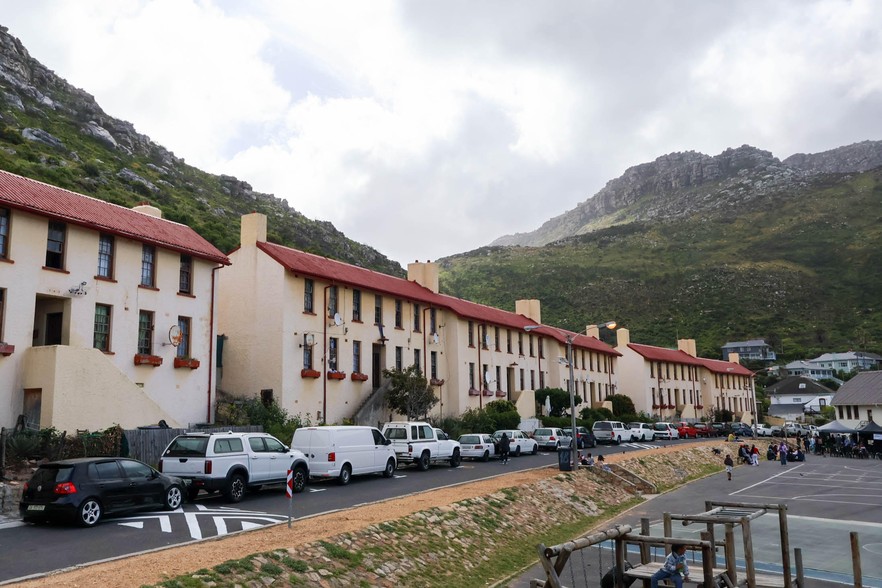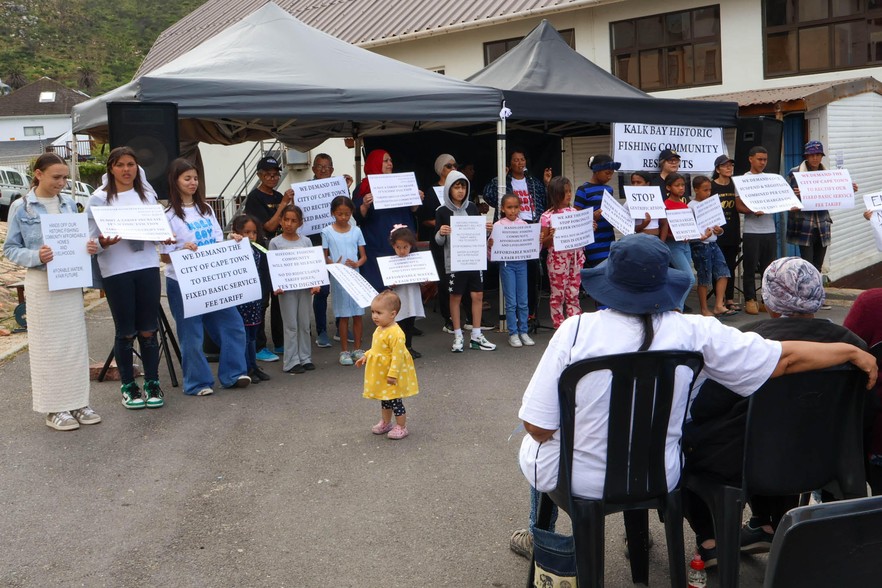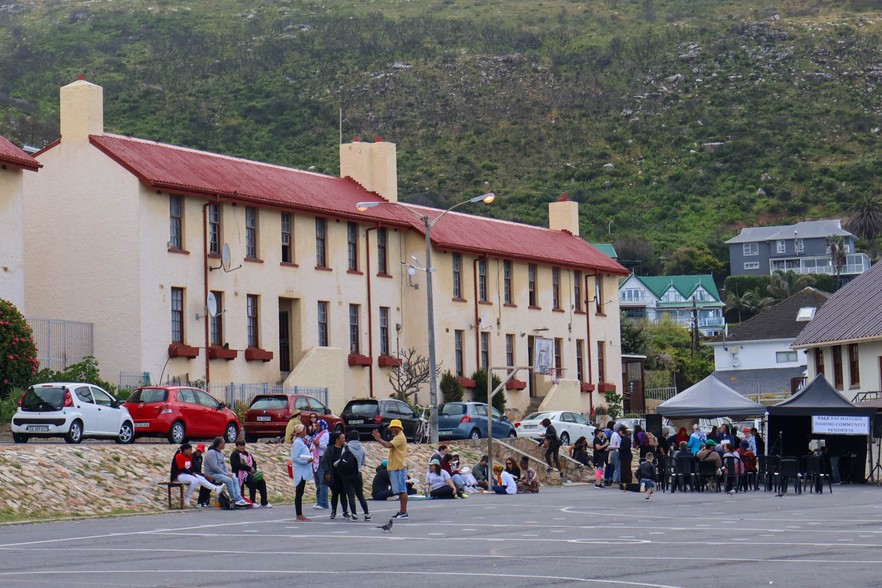We’re being pushed out, say Kalk Bay fishing families
Massive increase in water bills means they cannot afford to stay
These blocks of flats in Kalk Bay, built in the 1940s, have been inhabited by generations of fishing families. The families are concerned that high water bills are threatening their ability to keep living here. Photos: Liezl Human
- Fishing families who have lived in blocks of council flats in Kalk Bay for generations say they are being forced out of the community by a massive increase in their water bills.
- Many survived forced removals under the Slums Act of 1934 and again under the Group Areas Act during apartheid.
- In July their water service bill increased from about R200 per month to over R5,400 per month because of a change in the way the City is billing some cluster developments.
- The residents cannot afford the new bill.
- The City of Cape Town appears to acknowledge that the increase is partially due to an error. But the City also says the increase is due to the fact that some cluster developments have historically been subsidised by other water bill payers.
Tucked against the towering mountainside and surrounded by multi-million rand homes are blocks of council flats housing the historic fisher families of Kalk Bay in Cape Town.
The families live in several blocks of about 50 flats on Gordon Road. Many of the households have relied on the ocean to survive for many generations. Over the years hundreds of families were forced out of the community, but this group survived the Slums Act of 1934 and the Group Areas Act forced removals under apartheid.
Many of the families lived elsewhere in Kalk Bay before moving into these flats, which were built in the 1940s.
Today, Kalk Bay property prices are skyrocketing as the once quaint fishing community attracts wealthy homeowners and developers.
The community now fears that they will be forced out of their homes because their monthly water bills have increased to amounts they cannot afford.
They have pleaded with the City of Cape Town to rethink its newly imposed fixed rates. At a picket in the courtyard on Saturday, residents raised concerns about gentrification posing a threat to their historic fishing community.
Mymoena Poggenpoel, 68, has lived in Kalk Bay her whole life. For years, she said, each block was billed R211 per month for water services. The bill was split among the eight flats in each block because they share one water meter. However, in July this bill shot up to R5,466, which is over R680 per family — money they can’t afford.
In protest, the community has refused to pay this bill which has been incurring interest each month.
Community members protested on Saturday against the newly introduced fixed tariff on water.
Poggenpoel said that this fixed fee, along with the water levy that every Cape Town household has to pay, eroded her pension.
“We’ve always been a multicultural and multi-religious community. We all lived in harmony. This is serious gentrification,” said Poggenpoel.
She also said that residents have made numerous efforts to appeal the fixed fee with City officials but to no avail. They have also written to the mayor, the City Manager, the Council, and filed an appeal with the City’s ombudsman.
“Nobody has answered us properly. They did not give us a real reason,” said Poggenpoel.
In their complaint to the ombudsman, the community raised several concerns, including that no consultation was done before the new fee was implemented; that the tariff was “inconsistent with principles of fairness”; and that it was “financially punitive” specifically to the marginalised fishing community.
“The flats are here for our children and future generations. We’re here to stay. We’re going to make sure that our affordable housing, the inheritance, goes from family to family,” said Poggenpoel.
Rising water bills and gentrification in Kalk Bay are threatening the fishing community.
Local fisher, Faez Poggenpoel, urged residents at the gathering against selling their flats which is now considered “prime real estate”.
“People with money come at your weakest moment, and they offer … to buy your heritage from you. It seems enticing, and you think you need it at that time, but it’s not worth it,” he said.
“The youngsters need to understand that there is a threat to your heritage. If you don’t … put in the energy to protect it, and make sure you are a proud custodian of this legacy, then you’re going to lose it,” he said.
The City of Cape Town, in response to our questions, said that prior to the current financial year, “customers in sectional title developments in general paid a far lower proportion of fixed water charges compared to other residential ratepayers”.
Fixed charges are calculated according to connection size, with people living in cluster developments benefiting from the division of cost across many units. “This meant that other ratepayers were subsidising those in cluster developments, who were not making the same fixed contributions to funding the infrastructure necessary to provide reliable and sustainable water and sanitation services to a growing city. Under the new structure, residential ratepayers contribute according to their property value band to ensure a more equitable distribution of costs,” the City said.
The municipality nevertheless acknowledged that their system was duplicating charges for each meter in Kalk Bay. It was working to correct this, it said.
“While those in cluster developments may experience an above-average increase due to having been subsidised by other ratepayers in the past, lower-income customers still benefit from the equitable system of determining fixed charges by property value band as an indicator of affordability,” said the City.
Support independent journalism
Donate using Payfast

Don't miss out on the latest news
We respect your privacy, and promise we won't spam you.
Next: Workers take to the streets on World Day for Decent Work
Previous: Eastern Cape families affected by 2023 floods to wait until next year for houses
Letters
Dear Editor
A significant portion of Kalk Bay's appeal lies in its history and cultural diversity. There is rare privilege to be able to live in a town where the origins of its formation remain intact, i.e. the harbour and associated livelihoods. This is essentially the key factor in Kalk Bay's attraction, augmented by its setting and natural beauty. Integrated into that is a pride in having an opportunity to live in a community that survived the ravages of apartheid and is core to Kalk Bay's cultural identity.
It is a terrible irony that the rush to profit from this appeal is the very thing that undermines its value. I think it fair that businesses and real estate sales should be marginally taxed to subsidise the low income communities. Not as a charitable act but as an equity dividend for the value they bring to the town's commerce.
Besides, people have a legitimate claim to generational homes.
Dear Editor
The COCT should take a clear stance on communities that are destroyed by the investors fleeing from crime in Gauteng and other provinces. Between real estate agents, the "inkommers" and the COCT seeing these types of invasions that rob the current residents of their roofs over the heads, changing the general dealer's into an upmarket coffee shop, they are anything but investors. Why don't they invest in Mitchell's Plain, Delft or Kraaifontein? Only to boast to their Gauteng friends, "I like my 'huisie by die see.'"
The COCT should rather invest in making the area an attractive tourist destination.
© 2025 GroundUp. This article is licensed under a Creative Commons Attribution-NoDerivatives 4.0 International License.
You may republish this article, so long as you credit the authors and GroundUp, and do not change the text. Please include a link back to the original article.
We put an invisible pixel in the article so that we can count traffic to republishers. All analytics tools are solely on our servers. We do not give our logs to any third party. Logs are deleted after two weeks. We do not use any IP address identifying information except to count regional traffic. We are solely interested in counting hits, not tracking users. If you republish, please do not delete the invisible pixel.



